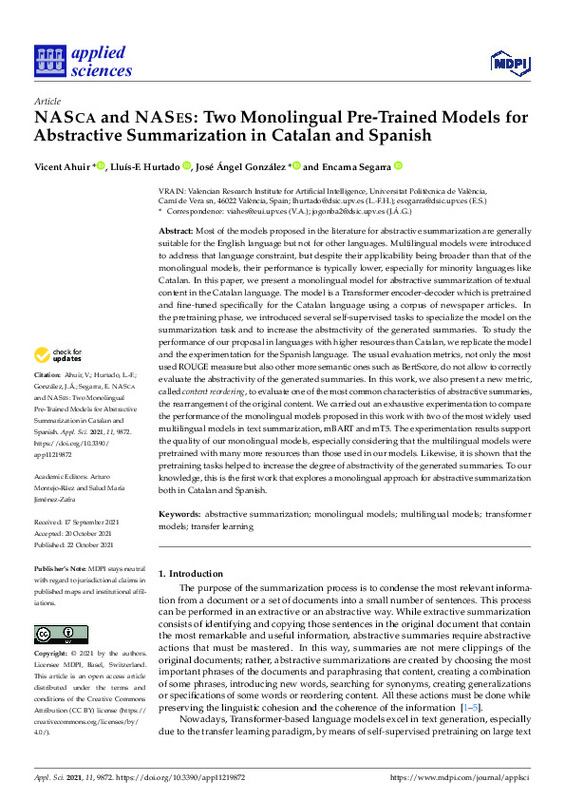JavaScript is disabled for your browser. Some features of this site may not work without it.
Buscar en RiuNet
Listar
Mi cuenta
Estadísticas
Ayuda RiuNet
Admin. UPV
NASca and NASes: Two Monolingual Pre-Trained Models for Abstractive Summarization in Catalan and Spanish
Mostrar el registro sencillo del ítem
Ficheros en el ítem
| dc.contributor.author | Ahuir-Esteve, Vicent
|
es_ES |
| dc.contributor.author | Hurtado Oliver, Lluis Felip
|
es_ES |
| dc.contributor.author | González-Barba, José Ángel
|
es_ES |
| dc.contributor.author | Segarra Soriano, Encarnación
|
es_ES |
| dc.date.accessioned | 2022-05-24T18:05:05Z | |
| dc.date.available | 2022-05-24T18:05:05Z | |
| dc.date.issued | 2021-11 | es_ES |
| dc.identifier.uri | http://hdl.handle.net/10251/182874 | |
| dc.description.abstract | [EN] Most of the models proposed in the literature for abstractive summarization are generally suitable for the English language but not for other languages. Multilingual models were introduced to address that language constraint, but despite their applicability being broader than that of the monolingual models, their performance is typically lower, especially for minority languages like Catalan. In this paper, we present a monolingual model for abstractive summarization of textual content in the Catalan language. The model is a Transformer encoder-decoder which is pretrained and fine-tuned specifically for the Catalan language using a corpus of newspaper articles. In the pretraining phase, we introduced several self-supervised tasks to specialize the model on the summarization task and to increase the abstractivity of the generated summaries. To study the performance of our proposal in languages with higher resources than Catalan, we replicate the model and the experimentation for the Spanish language. The usual evaluation metrics, not only the most used ROUGE measure but also other more semantic ones such as BertScore, do not allow to correctly evaluate the abstractivity of the generated summaries. In this work, we also present a new metric, called content reordering, to evaluate one of the most common characteristics of abstractive summaries, the rearrangement of the original content. We carried out an exhaustive experimentation to compare the performance of the monolingual models proposed in this work with two of the most widely used multilingual models in text summarization, mBART and mT5. The experimentation results support the quality of our monolingual models, especially considering that the multilingual models were pretrained with many more resources than those used in our models. Likewise, it is shown that the pretraining tasks helped to increase the degree of abstractivity of the generated summaries. To our knowledge, this is the first work that explores a monolingual approach for abstractive summarization both in Catalan and Spanish. | es_ES |
| dc.description.sponsorship | This work was partially supported by the Spanish Ministerio de Ciencia, Innovacion y Universidades and FEDER founds under the project AMIC (TIN2017-85854-C4-2-R), and by the Agencia Valenciana de la Innovacio (AVI) of the Generalitat Valenciana under the GUAITA (INNVA1/2020/61) project. | es_ES |
| dc.language | Inglés | es_ES |
| dc.publisher | MDPI AG | es_ES |
| dc.relation.ispartof | Applied Sciences | es_ES |
| dc.rights | Reconocimiento (by) | es_ES |
| dc.subject | Abstractive summarization | es_ES |
| dc.subject | Monolingual models | es_ES |
| dc.subject | Multilingual models | es_ES |
| dc.subject | Transformer models | es_ES |
| dc.subject | Transfer learning | es_ES |
| dc.subject.classification | LENGUAJES Y SISTEMAS INFORMATICOS | es_ES |
| dc.title | NASca and NASes: Two Monolingual Pre-Trained Models for Abstractive Summarization in Catalan and Spanish | es_ES |
| dc.type | Artículo | es_ES |
| dc.identifier.doi | 10.3390/app11219872 | es_ES |
| dc.relation.projectID | info:eu-repo/grantAgreement/AEI/Plan Estatal de Investigación Científica y Técnica y de Innovación 2013-2016/TIN2017-85854-C4-2-R/ES/AMIC-UPV: ANALISIS AFECTIVO DE INFORMACION MULTIMEDIA CON COMUNICACION INCLUSIVA Y NATURAL/ | es_ES |
| dc.relation.projectID | info:eu-repo/grantAgreement/AGENCIA VALENCIANA DE LA INNOVACION//INNVA1%2F2020%2F61//GUAITA: MONITORIZACION Y ANALISIS DE REDES SOCIALES PARA LA AYUDA A LA TOMA DE DECISIONES/ | es_ES |
| dc.rights.accessRights | Abierto | es_ES |
| dc.contributor.affiliation | Universitat Politècnica de València. Departamento de Sistemas Informáticos y Computación - Departament de Sistemes Informàtics i Computació | es_ES |
| dc.description.bibliographicCitation | Ahuir-Esteve, V.; Hurtado Oliver, LF.; González-Barba, JÁ.; Segarra Soriano, E. (2021). NASca and NASes: Two Monolingual Pre-Trained Models for Abstractive Summarization in Catalan and Spanish. Applied Sciences. 11(21):1-16. https://doi.org/10.3390/app11219872 | es_ES |
| dc.description.accrualMethod | S | es_ES |
| dc.relation.publisherversion | https://doi.org/10.3390/app11219872 | es_ES |
| dc.description.upvformatpinicio | 1 | es_ES |
| dc.description.upvformatpfin | 16 | es_ES |
| dc.type.version | info:eu-repo/semantics/publishedVersion | es_ES |
| dc.description.volume | 11 | es_ES |
| dc.description.issue | 21 | es_ES |
| dc.identifier.eissn | 2076-3417 | es_ES |
| dc.relation.pasarela | S\453465 | es_ES |
| dc.contributor.funder | AGENCIA ESTATAL DE INVESTIGACION | es_ES |
| dc.contributor.funder | European Regional Development Fund | es_ES |
| dc.contributor.funder | AGENCIA VALENCIANA DE LA INNOVACION | es_ES |
| upv.costeAPC | 2000 | es_ES |








